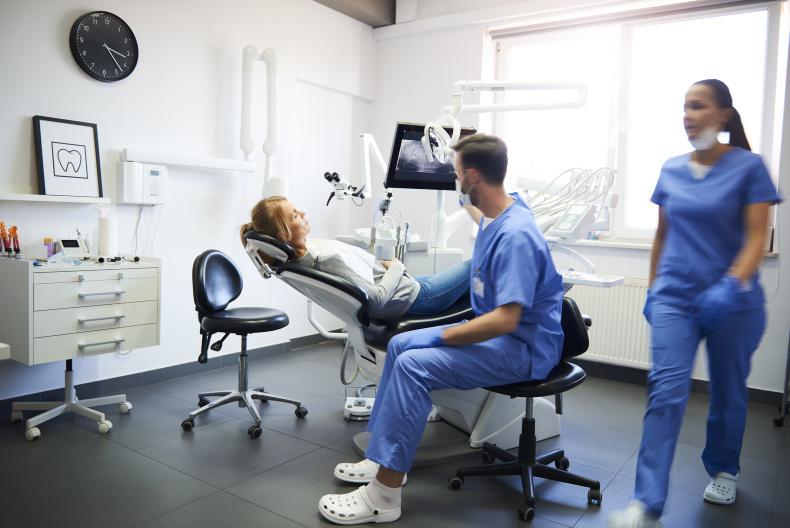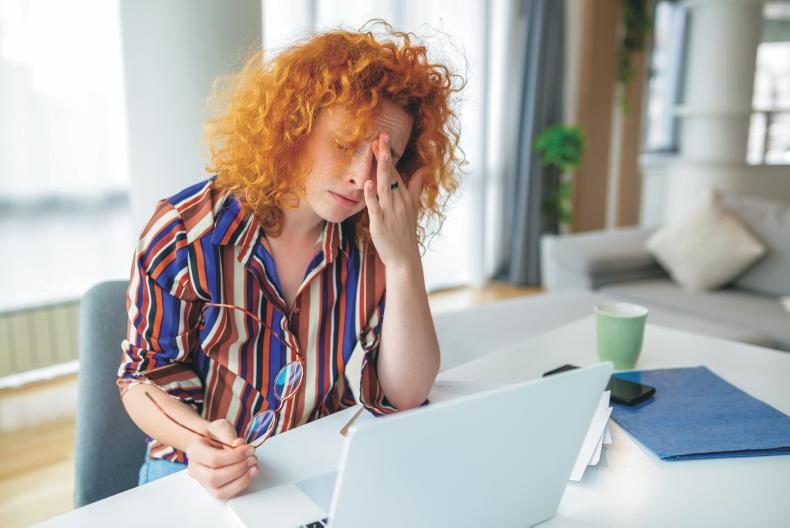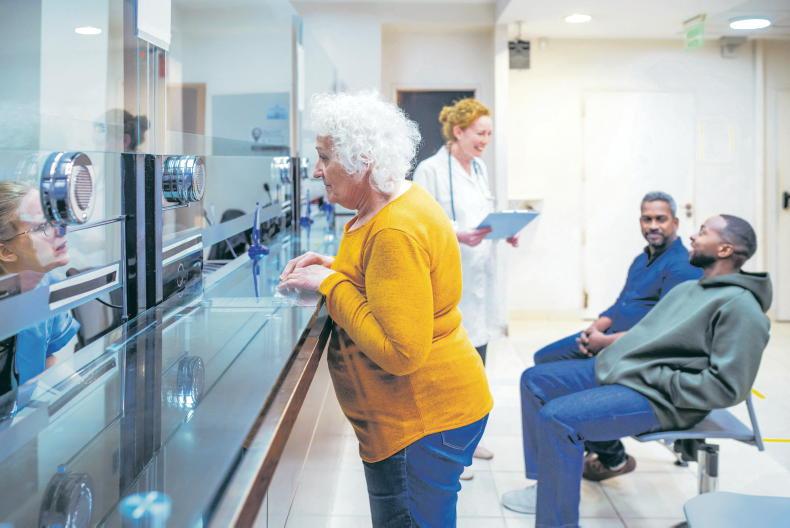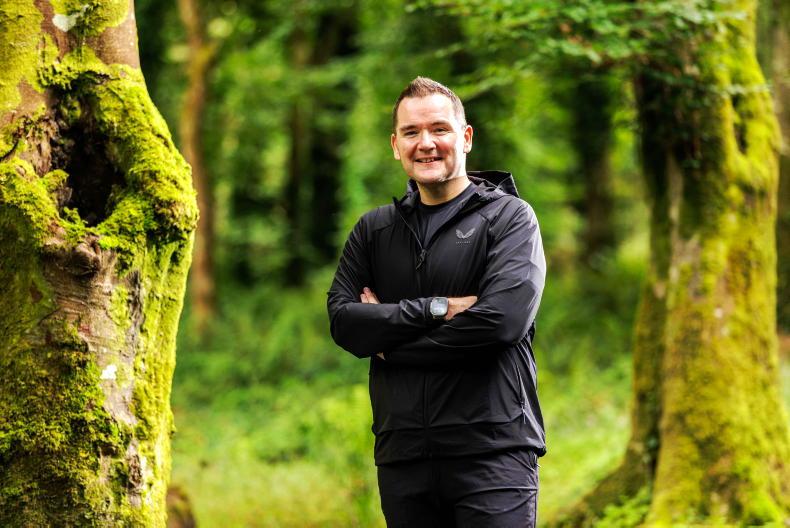Most of us are trying not to do it – get sick at a time when hospitals and GPs are preoccupied with a pandemic but life – and people getting ill – doesn’t stop just because there is an umbrella stress hovering over us all. What if you’ve a kidney infection or bad toothache or your vision suddenly deteriorates? Or you’ve put your back out or you feel that you are about to mentally ‘crack’ under the stress of cocooning?
To find out what the options are, Irish Country Living rang around to the people you should contact if you have such a problem – the GP, dentist, optician and physiotherapist. Would phones be answered? How quickly? Was anyone working in the practice? What could they do to help if one was in pain? In all cases the phones rang for longer than usual but they were answered. One provided a voicemail message.
GPs remain busy
The secretary at the GP’s practice was run off her feet answering the phone on Monday 27 April. After a definite drop off in attendance in the first few weeks there had been a definite increase in calls over the last week, she said. People were getting complacent, wanting to come in for more non-serious reasons. They were being triaged, however, and the sick getting priority.
The procedure at the doctor’s is that if one was reporting coronavirus symptoms the practice nurse would ring back and organise a test if necessary. If one wasn’t well and didn’t want to go into the surgery the doctor would ring back and diagnose if possible. If a patient has something like a rash and needed to physically see the doctor, he/she would ring from the car park and then wait until told to come in as numbers inside at any one time were strictly limited.
All regular check-ups have been cancelled at present. All doctors are wearing full personal protective equipment (PPE) at all times, Irish Country Living was told.
Opticians working solo
The optician contacted was working solo, behind closed doors. She was working a few hours a day, answering the phone, responding to emails. She would see someone in emergency eg with sudden vision problems that could suggest a detached retina or TIA (mini-stroke).
If she deemed the client’s problems not serious as she assessed their situation over the phone she would tell them that she would schedule an appointment for them as soon as restrictions lift. Eye examinations are the major loss, she said, impossible because of social distancing rules. She can send out contact lenses by post and organise that broken glasses be fixed but clients could only call to the door by arrangement. She is uncertain about how her work will be affected in the future – most probably PPE for her and mask wearing for patients.
Dentist there half the time
The dental practice contacted is open for half a day rather than a full day. Staff on the premises work in separate teams, and minimal staff are there at any one time. Emergency cases are being seen. Pain management is offered in the case of bad toothache and if it’s an abscess a prescription is given to clear the infection. While extractions could be done if absolutely necessary no fillings are allowed at the moment because of the danger of virus from the patient reaching the dentist in the aerosol created by dental equipment that pumps air in to clean a cavity. Micro particles of saliva in the atmosphere would result.
In the case of a filling falling out a dressing could be inserted as a temporary measure. PPE gear is worn when a patient comes in and every point in the patient’s route from door to surgery and back is disinfected as well as all equipment used, of course. Calls were coming from many patients of other practices that are currently closed also, she said.
Physio advice over the phone
The voicemail of the physiotherapist contacted says that only telephone or video call advice was possible at present. One could email the physiotherapist for advice/guidance in relation to ongoing or new treatment. If there had been no initial assessment advice given would be limited but they would do the best they could to give advice that might ease symptoms.
Decline in routine consultations
People not going to the doctor when they are sick at present is a concern for doctors. GPs in the Irish Medical Organisation (IMO), for example, are urging patients with non COVID-19 health issues to contact their GPs for a consultation or assessment now.This is in order to avoid longer term health complications.
Dr Madeleine Ní Dhálaigh, a GP in Roscommon and a member of the IMO GP Committee, said that the decline in “routine” appointments by patients over recent weeks was a source of concern not comfort for GPs. “People haven’t simply got healthier,” she says.
“The reality is that many are simply ignoring warning signs and risking larger health problems down the line because COVID-19 has become our only focus of discussion or debate.
Patients have been extraordinarily supportive of GPs and many have delayed contacting them about their own issues for fear of adding to pressures on the GP service at this time. But we are now appealing to people to make contact with us. You can talk to your GP over the phone who can then assess your situation and advise you on next steps.”
Dr Ní Dhálaigh said that the establishment of Community Assessment Hubs for COVID-19 cases freed up GPs to deal with more non-COVID 19 cases and enable GPs to see patients in their surgeries for a personal consultation if that is required.
What if you are under real psychological pressure because of the virus and the lockdown and know you need help? With no face-to-face counselling available, what can you do?
Luckily many counsellors are now able to provide a Skype or Facetime service if needed. You can find a counsellor at the Irish Association for Counselling and Psychotherapy’s (IACP) Find a counsellor page. In emergency don’t forget numbers like the Samaritans – 116 123.
Helplink Mental Health provides a low-cost online counselling service at: helplink.ie and has now added to its service with Mind Hacks. Mind Hacks by Helplink (mindhacks.ie) is an online platform that provides video and podcast content, from national and international sources, around the topics of mental health and emotional wellbeing.
Some of the content contributors to the video and podcast libraries are: Mental Health Ireland, GROW.ie, Mental Health Reform, Anam Cara, First Fortnight, St Patrick’s Mental Health Services and many more. The content is being updated on a continuous basis and is available 24/7, 365 days of the year.
CEO of Helplink Lochlann Scott says: “We were going to release this platform later in the year but we felt that it is more important than ever for people to have accessible information on taking care of your mental health and your emotional wellbeing; in a way that people are more likely to engage with.
“Through our research, over many years we have seen that people are far more likely to engage with video and podcast content than the written word, that’s why we do not provide articles on the platform, just video and podcast libraries.”
Since the COVID crisis began Helplink has been providing free online counselling services nationwide, seven days a week and out of hours, to people who have been laid off work, people with addictions – gambling, alcohol and/or drugs and also to returning Irish emigrants and for the Irish stuck/living abroad, Lochlann says.
They are also continuing to provide their low-cost online counselling services for young people, couples, those who are bereaved and people who are employed. They are also providing parental support counselling to replace their play therapy services during this crisis.
New regulations for prescriptions
Because of COVID-19, regulations related to prescriptions have changed to help Irish patients at this time. The Medicinal Products (Prescription and Control of Supply) (Amendment) Regulations 2020 allow for:
The electronic transfer of prescriptions from prescribers to the pharmacy via the HSE’s secure Healthmail system.Increase the maximum period of validity of a prescription from six to nine months.Allow pharmacists to give 10 days’ supply of medicines in an emergency (previously five days), extend the range of medicines that can be supplied in an emergency for epilepsy and, for the first time, allow five days’ emergency supply of controlled drugs.Outpatient, daycase or inpatient
appointments
The HSE website has details of service disruptions during the COVID-19 crisis in each hospital. This list is updated frequently.
Outpatient clinics: In general, all outpatient clinics with the exception of oncology and antenatal clinics have been postponed and will be rescheduled as soon as possible.
Day and inpatient surgeries: All non-urgent elective surgery has been postponed. Most state that they will be in touch with patients to reschedule for a later date. Bigger hospitals like St Vincent’s University Hospital state that all clinical teams are reviewing each patient on a case by case basis and will contact patients to attend earlier if clinically required to do so. CL
Symptoms you should never ignore
Sudden severe headache or severe indigestion or severe pain between your shoulder blades – could be brain or heart related.Blood anywhere it normally should not be – in urine, bowel motions or from spitting.New lumps or growths on your skin.Shortness of breath. Sores that won’t heal.
See www.hse.ie for its A-Z of conditions and symptoms.
Emergency calls
Emergency departments (EDs) are still open and are there to help in all medical emergencies. In particular, if you or someone else is showing signs of a stroke or heart attack do not be afraid to go to your local emergency department of call 112 or 999 immediately for emergency help. Stroke and heart attacks are life-threatening medical emergencies.
A useful cocooning with Chronic Obstruction Pulmonary Disease (COPD) information pack is now available from www.copd.ie or can be ordered for postal delivery free of charge by texting the word “COPD”, plus name and address to 51444 (standard network charges apply). The COPD adviceline is also available on freefone 1800 83 21 46.Tele-rehabilitation services are now being offered by Acquired Brain Injury Ireland to deliver essential neuro-rehabilitation to clients’ homes via video call.Specsavers has launched a new RemoteCare option where you can talk to them about your care needs via telephone or video call.Parents need to continue to get their babies vaccinated on time during the COVID-19 pandemic, according to the director of the HSE National Immunisation Office Dr Lucy Jessop.
Most of us are trying not to do it – get sick at a time when hospitals and GPs are preoccupied with a pandemic but life – and people getting ill – doesn’t stop just because there is an umbrella stress hovering over us all. What if you’ve a kidney infection or bad toothache or your vision suddenly deteriorates? Or you’ve put your back out or you feel that you are about to mentally ‘crack’ under the stress of cocooning?
To find out what the options are, Irish Country Living rang around to the people you should contact if you have such a problem – the GP, dentist, optician and physiotherapist. Would phones be answered? How quickly? Was anyone working in the practice? What could they do to help if one was in pain? In all cases the phones rang for longer than usual but they were answered. One provided a voicemail message.
GPs remain busy
The secretary at the GP’s practice was run off her feet answering the phone on Monday 27 April. After a definite drop off in attendance in the first few weeks there had been a definite increase in calls over the last week, she said. People were getting complacent, wanting to come in for more non-serious reasons. They were being triaged, however, and the sick getting priority.
The procedure at the doctor’s is that if one was reporting coronavirus symptoms the practice nurse would ring back and organise a test if necessary. If one wasn’t well and didn’t want to go into the surgery the doctor would ring back and diagnose if possible. If a patient has something like a rash and needed to physically see the doctor, he/she would ring from the car park and then wait until told to come in as numbers inside at any one time were strictly limited.
All regular check-ups have been cancelled at present. All doctors are wearing full personal protective equipment (PPE) at all times, Irish Country Living was told.
Opticians working solo
The optician contacted was working solo, behind closed doors. She was working a few hours a day, answering the phone, responding to emails. She would see someone in emergency eg with sudden vision problems that could suggest a detached retina or TIA (mini-stroke).
If she deemed the client’s problems not serious as she assessed their situation over the phone she would tell them that she would schedule an appointment for them as soon as restrictions lift. Eye examinations are the major loss, she said, impossible because of social distancing rules. She can send out contact lenses by post and organise that broken glasses be fixed but clients could only call to the door by arrangement. She is uncertain about how her work will be affected in the future – most probably PPE for her and mask wearing for patients.
Dentist there half the time
The dental practice contacted is open for half a day rather than a full day. Staff on the premises work in separate teams, and minimal staff are there at any one time. Emergency cases are being seen. Pain management is offered in the case of bad toothache and if it’s an abscess a prescription is given to clear the infection. While extractions could be done if absolutely necessary no fillings are allowed at the moment because of the danger of virus from the patient reaching the dentist in the aerosol created by dental equipment that pumps air in to clean a cavity. Micro particles of saliva in the atmosphere would result.
In the case of a filling falling out a dressing could be inserted as a temporary measure. PPE gear is worn when a patient comes in and every point in the patient’s route from door to surgery and back is disinfected as well as all equipment used, of course. Calls were coming from many patients of other practices that are currently closed also, she said.
Physio advice over the phone
The voicemail of the physiotherapist contacted says that only telephone or video call advice was possible at present. One could email the physiotherapist for advice/guidance in relation to ongoing or new treatment. If there had been no initial assessment advice given would be limited but they would do the best they could to give advice that might ease symptoms.
Decline in routine consultations
People not going to the doctor when they are sick at present is a concern for doctors. GPs in the Irish Medical Organisation (IMO), for example, are urging patients with non COVID-19 health issues to contact their GPs for a consultation or assessment now.This is in order to avoid longer term health complications.
Dr Madeleine Ní Dhálaigh, a GP in Roscommon and a member of the IMO GP Committee, said that the decline in “routine” appointments by patients over recent weeks was a source of concern not comfort for GPs. “People haven’t simply got healthier,” she says.
“The reality is that many are simply ignoring warning signs and risking larger health problems down the line because COVID-19 has become our only focus of discussion or debate.
Patients have been extraordinarily supportive of GPs and many have delayed contacting them about their own issues for fear of adding to pressures on the GP service at this time. But we are now appealing to people to make contact with us. You can talk to your GP over the phone who can then assess your situation and advise you on next steps.”
Dr Ní Dhálaigh said that the establishment of Community Assessment Hubs for COVID-19 cases freed up GPs to deal with more non-COVID 19 cases and enable GPs to see patients in their surgeries for a personal consultation if that is required.
What if you are under real psychological pressure because of the virus and the lockdown and know you need help? With no face-to-face counselling available, what can you do?
Luckily many counsellors are now able to provide a Skype or Facetime service if needed. You can find a counsellor at the Irish Association for Counselling and Psychotherapy’s (IACP) Find a counsellor page. In emergency don’t forget numbers like the Samaritans – 116 123.
Helplink Mental Health provides a low-cost online counselling service at: helplink.ie and has now added to its service with Mind Hacks. Mind Hacks by Helplink (mindhacks.ie) is an online platform that provides video and podcast content, from national and international sources, around the topics of mental health and emotional wellbeing.
Some of the content contributors to the video and podcast libraries are: Mental Health Ireland, GROW.ie, Mental Health Reform, Anam Cara, First Fortnight, St Patrick’s Mental Health Services and many more. The content is being updated on a continuous basis and is available 24/7, 365 days of the year.
CEO of Helplink Lochlann Scott says: “We were going to release this platform later in the year but we felt that it is more important than ever for people to have accessible information on taking care of your mental health and your emotional wellbeing; in a way that people are more likely to engage with.
“Through our research, over many years we have seen that people are far more likely to engage with video and podcast content than the written word, that’s why we do not provide articles on the platform, just video and podcast libraries.”
Since the COVID crisis began Helplink has been providing free online counselling services nationwide, seven days a week and out of hours, to people who have been laid off work, people with addictions – gambling, alcohol and/or drugs and also to returning Irish emigrants and for the Irish stuck/living abroad, Lochlann says.
They are also continuing to provide their low-cost online counselling services for young people, couples, those who are bereaved and people who are employed. They are also providing parental support counselling to replace their play therapy services during this crisis.
New regulations for prescriptions
Because of COVID-19, regulations related to prescriptions have changed to help Irish patients at this time. The Medicinal Products (Prescription and Control of Supply) (Amendment) Regulations 2020 allow for:
The electronic transfer of prescriptions from prescribers to the pharmacy via the HSE’s secure Healthmail system.Increase the maximum period of validity of a prescription from six to nine months.Allow pharmacists to give 10 days’ supply of medicines in an emergency (previously five days), extend the range of medicines that can be supplied in an emergency for epilepsy and, for the first time, allow five days’ emergency supply of controlled drugs.Outpatient, daycase or inpatient
appointments
The HSE website has details of service disruptions during the COVID-19 crisis in each hospital. This list is updated frequently.
Outpatient clinics: In general, all outpatient clinics with the exception of oncology and antenatal clinics have been postponed and will be rescheduled as soon as possible.
Day and inpatient surgeries: All non-urgent elective surgery has been postponed. Most state that they will be in touch with patients to reschedule for a later date. Bigger hospitals like St Vincent’s University Hospital state that all clinical teams are reviewing each patient on a case by case basis and will contact patients to attend earlier if clinically required to do so. CL
Symptoms you should never ignore
Sudden severe headache or severe indigestion or severe pain between your shoulder blades – could be brain or heart related.Blood anywhere it normally should not be – in urine, bowel motions or from spitting.New lumps or growths on your skin.Shortness of breath. Sores that won’t heal.
See www.hse.ie for its A-Z of conditions and symptoms.
Emergency calls
Emergency departments (EDs) are still open and are there to help in all medical emergencies. In particular, if you or someone else is showing signs of a stroke or heart attack do not be afraid to go to your local emergency department of call 112 or 999 immediately for emergency help. Stroke and heart attacks are life-threatening medical emergencies.
A useful cocooning with Chronic Obstruction Pulmonary Disease (COPD) information pack is now available from www.copd.ie or can be ordered for postal delivery free of charge by texting the word “COPD”, plus name and address to 51444 (standard network charges apply). The COPD adviceline is also available on freefone 1800 83 21 46.Tele-rehabilitation services are now being offered by Acquired Brain Injury Ireland to deliver essential neuro-rehabilitation to clients’ homes via video call.Specsavers has launched a new RemoteCare option where you can talk to them about your care needs via telephone or video call.Parents need to continue to get their babies vaccinated on time during the COVID-19 pandemic, according to the director of the HSE National Immunisation Office Dr Lucy Jessop. 








SHARING OPTIONS